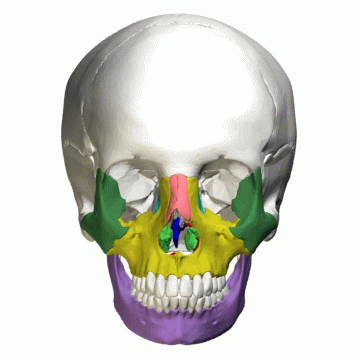https://commons.wikimedia.org/wiki/File:Creatine_molecule_ball.png, Jynto (more from this user), CC0, via Wikimedia Commons
Deborah Tosline wrote and published “Skin Remodeling DIY: An Introduction to the Underground World of Do-It-Yourself Skincare” in 2015. Her approach to skin care is based on a scientific background, love of research and over 40 years of DIY skincare experience.
The most popular articles that I’ve published are about facial bone maintenance and rejuvenation. Bone maintenance is an important lifelong endeavor for optimal health. Facial bone maintenance may help retain facial characteristics over time. Facial bone loss is well documented and is the culprit behind my pesky eye wrinkles as a result of orbital bone loss. No lotion or cream will eliminate skin wrinkles that are due to bone loss. Fillers? Hard pass. Wolf’s Law describes the potential to build bone but to do so, the body needs the right ingredients to support bone formation or ossification. Bone remodeling requires a healthy biochemistry to support regeneration. Early research shows that creatine is beneficial for skin AND bone health.
https://commons.wikimedia.org/wiki/File:Facial_bones_-_animation03.gif, Polygon data is from BodyParts3D, CC BY-SA 2.1 JP <https://creativecommons.org/licenses/by-sa/2.1/jp/deed.en>, via Wikimedia Commons
Creatine is comprised of three amino acids: glycine, methionine and arginine. Research shows that men who weigh about 150 pounds (70 kg) and are in the 20- to 39-year age group lose about 2 grams (g) of creatine.
Creatine is primarily derived by consuming meat and fish. In addition, the body naturally produces about 1 g of creatine per day.
About half of creatine losses may be replaced by consuming meat and fish. Vegetarians are advised to satisfy all of their needs by supplementing with creatine.
Although the body produces some creatine, even muscle building omnivores supplement with creatine to increase muscle mass, energy and performance. Creatine supplementation may benefit vegetarians the most.
https://commons.wikimedia.org/wiki/File:Muscle_Total_Creatine_Stores.png, Richard B. Kreider, CC BY 4.0 <https://creativecommons.org/licenses/by/4.0>, via Wikimedia Commons
Creatine may be used to:
increase strength, muscle size and performance.
support muscle, bone, ligament, tendon and nerve health.
treat rare creatine deficiency syndromes.
support brain health and cognitive tasks.
improve skeletal muscle and bone density.
support skin health with topical application of creatine cream.
https://commons.wikimedia.org/wiki/File:Illu_muscle_structure.jpg, Image:https://training.seer.cancer.gov/images/anatomy/muscular/muscle_structure.jpg, Public domain, via Wikimedia Commons
Creatine for Muscle and Bone Health
Sarcopenia is an age-related decline of muscle mass associated with bone loss and inflammation. Research shows that creatine may be used to improve muscle mass and strength, and decrease inflammation.
Evidence shows that creatine is involved in activating cells associated with bone building. Creatine supplementation has been shown to increase muscle mass and strength. In addition, it may increase metabolism, the production of growth factors and may provide anti-inflammatory benefits.
https://commons.wikimedia.org/wiki/File:Bone_regeneration_-_Bone_remodeling_cycle_III_-_Osteoclasts_Monocytes_Pre-osteoblasts_etc_--_Smart-Servier_(cropped).jpg, Laboratoires Servier, CC BY-SA 3.0 <https://creativecommons.org/licenses/by-sa/3.0>, via Wikimedia Commons
Creatine and Skin Health
Creatine’s antioxidant activity protects against stressors including sun damage. Topical application of creatine improves cellular energy and has been shown to improve skin health.
Research shows that using a creatine cream for 6 weeks “significantly reduced the sagging cheek intensity in the jowl area, crow’s feet wrinkles, and wrinkles under the eyes.”
What!! I struggle to refrain from making creatine cream right now.
The study also showed that “topically applied creatine rapidly penetrates the dermis, stimulates collagen synthesis, and influences gene expression and protein.”
https://commons.wikimedia.org/wiki/File:Skin.png, US-Gov, Public domain, via Wikimedia Commons
Creatine Concerns and Notes
Creatine is a well-studied sports supplement that is deemed to be safe. There have been some concerns about taking creatine. A meta study evaluated scientific references and found that creatine:
is not always associated with water retention.
does not have masculinizing effects.
does not damage kidneys or cause renal dysfunction when taken at normal dosages by healthy folks.
is not associated with hair loss.
does not dehydrate or promote muscle cramps.
does not result in gaining weight.
supplementation appears safe and beneficial for children and teenagers.
supplementation alone can provide muscle strengthening benefits for older adults.
provides a variety of benefits for females throughout life.
is best supplemented using creatine monohydrate.
Creatine Interactions
Although more research is needed, the effects of creatine may be reduced when it is consumed with 300 milligrams of coffee or more; further this combination may enhance the progression of Parkinson’s.
Creatine Dosage
Creatine dosing is dependent on a variety of factors including:
https://commons.wikimedia.org/wiki/File:Wiki-Peace-Street_art_02.jpg, Marko Kafé, CC0, via Wikimedia Commons
My perspective
While searching for natural methods to nourish tendons, muscles and bones, I learned about the benefits of creatine. I’ve been a vegetarian for 33 years, periodic pescatarian, and ovo-lacto-vegetarian for the past 5 years. I did not know about the importance of creatine and let me tell you, creatine got my attention. I began supplementing with 5 g/day about a month ago.
I continue to learn more about the advantages of creatine supplementation for women by watching YouTube videos and am pleasantly surprised. I found scientific journal articles to support the YouTube claims and further embrace creatine. I am excited to test a DIY creatine cream and watch for any skin health improvements.
If you need more information, check out the local library, search the Internet, or check out my past Blog articles. It would be an honor for me if you purchased my facial care book. Thank you!
Take good care of yourselves!
XO Deborah
This article is intended to be used as general information only and is in no way intended to replace medical advice, be used as a medical treatment program, diagnosis, or cure of any disease or medical condition. There are no warranties, expressed or implied, regarding the effectiveness of the practices described in this article. Products or substances discussed herein are for educational purposes only and are not intended as recommendations of the author.






